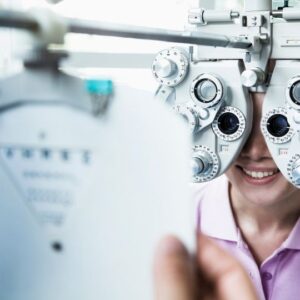Tips for Selecting the Best Dental and Vision Insurance for Your Needs

Finding the right dental and vision insurance is just as important as finding a good medical insurance policy. Without dental insurance, you may put off getting regular cleanings or even going to the dentist when you’re in pain. Likewise, you may decide that your glasses are fine, even if they have a crack in one lens and are over five years old. However, putting off visits to these two specialists can have long-term effects on your health. That’s why these two types of insurance are so important.
Finding the right dental and vision policies may seem challenging at first, but it’s worth doing your research. Not all vision and dental plans are the same. Here are a few tips to help you find the right policies for you.
Finding the Right Vision Insurance
Choosing the right vision insurance begins by evaluating your options. What you and your family need in a vision policy depends on your overall health. If none of your family members wear glasses and have healthy eyes, you may want to look at a plan that offers very affordable yearly office visits. However, if you need glasses, have certain health conditions that could affect your vision, or are concerned that you or your children may need eye care in the future, you want to consider plans that cover a wide variety of services.
If you’re considering LASIK or other refractive eye surgery options, you will want to closely examine how the policy covers these surgeries. Most basic plans do cover annual exams and a pair of essential glasses. Many do cover contacts, but they may not all pay the same amount. Some may not provide any coverage at all.
Another area to closely read is the part of the policy that explains how the insurance covers items such as progressive lenses, anti-reflective lens coating, polarized sunglasses, and other specialty lenses. Again, the coverage here can vary widely from plan to plan. When asking the question, “is vision insurance worth it?” the answer will depend on how your insurance covers the items you need. That’s why it’s important to make sure the plan you select closely aligns with those needs.
Do You Qualify for Specific Vision Plans?
Some insurance companies offer specific vision plans for those with specific needs. For example, there are vision plans aimed at seniors. These plans typically provide better coverage for vision conditions seniors deal with often. Some colleges offer student health and vision plans for those who are under 26 but are not able to remain on their parents’ policies. Be sure to ask about specific policies when looking at your options.
Look at the Network
Like medical insurance plans, most vision insurance plans have a specific network of providers. If your optometrist is not in this network, you will have to pay more to continue seeing them. To get the most out of your insurance, you will need to use only providers in the network. If that network is relatively small, you may not have many options. Be sure you look at who is in-network and what services they offer before selecting a plan.
Look at How Your Vision and Medical Insurance Will Work Together
While glasses and other costs related to correcting your vision often fall under the umbrella of vision insurance, there are other procedures related to your eyes that may not. For example, cataract surgery and glaucoma may not be covered by your vision plan. In this case, you will want to look at your medical insurance and may need to find out what it covers. If they’re not and you know you will need care related to one of these conditions, you’ll want to contact your health insurance provider.
There are many different conditions that affect the eyes. It’s important to understand which conditions may fall under vision insurance and which may be considered a medical claim. Before you purchase vision insurance in California, working this out will ensure you don’t have to untangle any red tape later.
Selecting the Right Dental Insurance
Dental insurance is a little different from medical and vision insurance in some ways. However, it’s just as important. Dental work can quickly add up. However, if you don’t address issues with your teeth and gums, you can lose them. Infections can even spread from your mouth to other parts of your body. Dental insurance will help with these costs.
How Does Dental Insurance Work?
With health and vision insurance, most of your expenses are typically covered. Of course, you do have to meet your deductible, but many plans have very low or even no deductibles. After that, the insurance pays a percentage of all qualifying procedures, visits, and medication. When you hit your out-of-pocket maximum for the year, the insurance will pay 100% of all qualifying costs. This max can be quite high, but it does put a cap on the cost of healthcare.
Dental insurance, however, works differently. Most are considered 100-80-50 plans. This means that the plan covers all the costs of cleanings, checkups, and other preventative care. However, if you need a basic procedure such as having a filling put in, the insurance only pays 80% of that cost. For advanced procedures like root canals, the plan only pays half. This means you’ll still be paying a good amount of money for some procedures. Dental insurance policies have a deductible, too. This is usually relatively low, but don’t forget to factor it into your costs when choosing dental insurance.
Understanding the Waiting Period
Another thing to keep in mind is that many dental insurance plans have a waiting period. This means those plans will not begin paying out for specific procedures until the waiting period is over. Many will pay for checkups and other preventative care right away. Still, they may not cover advanced procedures for a year or more. If you need dental work soon, you may want to look for dental insurance with no waiting period. These plans may be more expensive, but they will start helping you cover your costs immediately.
Fortunately, while it may take some time before your dental plan will cover more than preventative care, the low premiums still make this type of insurance worth it. The cost of two regular cleanings and an annual X-ray are usually the same or more than the cost of dental insurance. Once you have completed the waiting period, your return on this investment will only increase.
Dental Insurance Caps
However, in addition to the waiting period, there is another major downside to some dental insurance: the coverage cap. Unlike health or vision insurance, most dental policies will only pay for a certain amount of dental work in one year. If you have a low cap, you can easily use it up with a single procedure. For example, if your cap is $1,000 and you have to have two root canals, you may hit that cap right away. That’s because even on the low end, a root canal can cost around $800. If these are difficult-to-reach teeth that need to be reshaped or have other work done, it each easily be over $1,000 a tooth. If your dental policy covers root canals at 50%, they will only pay out $500 a tooth. Two teeth, then, equal your yearly cap.
This means that your policy won’t cover anything else for the year. That can significantly impact your budget.
What do Dental Plans Cover?
Like vision insurance, dental policies may cover a vast number of things. You will want to carefully consider what and how much a policy will pay before you purchase one. Some dental insurance covers implants, for example, but some plans do not. Some plans consider this a cosmetic procedure, even though going without an implant or denture can seriously affect your oral health.
Again, some procedures related to your teeth and mouth may fall under medical insurance rather than dental. Sometimes there is overlap. Correcting an overbite, for example, typically falls under dental insurance. Dealing with an abscessed tooth, though, can be covered by medical insurance and dental insurance. Any oral surgery generally falls under medical, especially if it is done at a hospital and requires anesthesia. Like with vision procedures, you will want to work with your health insurance to determine what they will cover and what your dental plan will need to handle.
Choosing the Right Plans Isn’t Always Simple or Easy
If you’re new to understanding dental and vision insurance, you may find yourself facing pages of terms that you’re unfamiliar with. These terms are often the keys to understanding what the policy will do for you. Still, they’re also very easy to misunderstand.
That’s where the team at J.C. Lewis Insurance Services comes in. We have years of experience helping individuals and businesses find the right health, dental, and vision insurance policies. We can assist you in comparing plans, looking for policies that meet your needs, and answering any questions you may have. If you’re ready to find a dental and vision plan, contact us today.

The post Tips for Selecting the Best Dental and Vision Insurance for Your Needs appeared first on JC Lewis Insurance.








